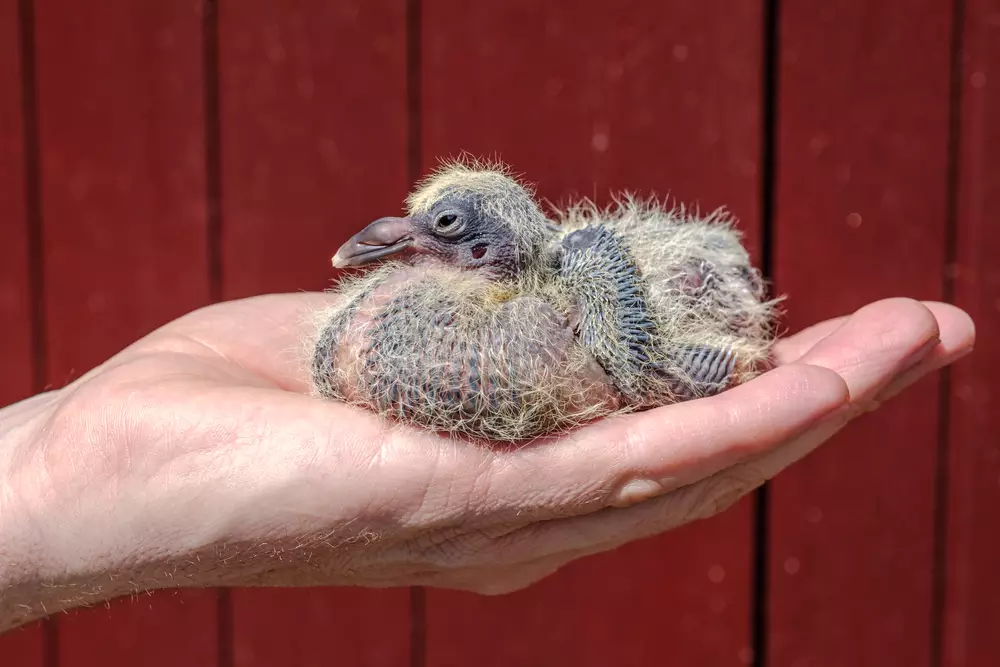Urban areas are a hub of varied wildlife, among which pigeons are an integral part. Despite their widespread presence, it’s a rare sight to spot a baby pigeon. This peculiarity has been a source of intrigue for many. Why are baby pigeons so elusive?
The phenomenon of seemingly non-existent baby pigeons is due to the species’ unique life cycle and nesting habits. Baby pigeons, or squabs, spend a substantial amount of time in their nests, hidden from the public eye. They only venture out once they resemble adult pigeons in size and appearance.
This behaviour in pigeons, while mysterious, has vital evolutionary and environmental reasons. It gives us a glimpse into the intricacies of nature and the survival strategies of urban wildlife.
Pigeon Life Cycle
The Incubation Period
Pigeons have a fascinating life cycle. A pigeon’s egg incubates for approximately 18 days before it hatches. The parents take turns to warm the egg, ensuring constant care and protection.
Hatchling Stage
Once hatched, the baby pigeons, also known as squabs or hatchlings, are entirely dependent on their parents for food and protection. The squabs are fed “crop milk”, a highly nutritious substance produced by the parents. This stage of total dependence lasts for about a month.
Fledgling Phase
The fledgling phase begins when squabs are around one month old. By this time, they have grown feathers and are ready to venture out of their nests. However, they still resemble adult pigeons, which is a key reason why people rarely see ‘baby’ pigeons.
Hidden From Sight: Nesting Habits
Nest Location and Structure
Pigeon nests are typically built in concealed, inaccessible places. You might find them in the niches of tall buildings, under bridges, or in the crevices of cliffs. This seclusion provides safety and protection for the baby pigeons, keeping them out of sight.
Pigeon Parenting Strategies
Pigeon parents show remarkable dedication. They take turns looking after their young, ensuring that the squabs are never left alone. This diligent parenting keeps the baby pigeons safely tucked away in their nests, invisible to the outside world.

Why Baby Pigeons Stay Hidden
Protection from Predators
Staying hidden is a survival strategy for baby pigeons. Their secluded nesting places and absent presence in public spaces help protect them from potential predators, ensuring a better chance of survival.
Effect of Urban Environment
Urban environments influence the pigeon’s nesting habits. The plethora of high-rise buildings and bridges offer numerous hidden spots for pigeons to build their nests. This keeps baby pigeons concealed, making them a rare sight.
The Illusion of “Disappearance”
Rapid Growth of Pigeons
Pigeons grow at a remarkable pace. By the time squabs are ready to leave the nest, they are almost the same size as their parents. Their adult-like size further perpetuates the illusion that baby pigeons don’t exist.
Adult-like Appearance
Apart from their size, young pigeons also resemble adults in their appearance, complete with similar feathers and colouring. Hence, unless one pays close attention, it’s easy to mistake a young pigeon for an adult one.
Pigeon vs. Other Birds: Differences in Growth
Comparative Study with Common Birds
Compared to common birds like sparrows or robins, pigeons have a unique growth pattern. While most bird fledglings are easily identifiable, pigeon fledglings blend in with the adults due to their similar size and appearance.
Role of Genetics and Environment
The rapid growth and development of pigeons can be attributed to their genetics and the environment they inhabit. The harsh urban environment necessitates fast growth for better survival chances.
How to Spot a Baby Pigeon
Identifying Physical Features
Despite their adult-like size, young pigeons have distinct physical features. Their feathers are fluffier, and their beaks may show a white or pale yellow tip, a sign of their youth.
Behavioral Signs
Behavioral cues can also indicate a pigeon’s age. Young pigeons are usually less adept at flying and may seem more clumsy or unsure compared to adult pigeons.
Conservation and Coexistence
The Significance of Pigeons in Ecosystem
Pigeons play a crucial role in maintaining our urban ecosystems. They are part of the food chain, act as seed dispersers, and their presence indicates the health of the urban environment.
Role of Humans in Pigeon Conservation
Humans have a significant role in pigeon conservation. By fostering a sense of coexistence and ensuring that urban environments are safe for these birds, we can support their survival and growth.
Frequently Asked Questions
Why do pigeons grow so fast?
Pigeons grow rapidly due to their unique genetics and the challenging urban environments they inhabit. Fast growth enhances their survival chances, enabling them to blend in with adult pigeons and evade predators.
Are baby pigeons safe from predators in the city?
Urban environments provide a certain degree of protection for baby pigeons. Their nesting habits in high, concealed places, combined with the absence of traditional predators, make cities relatively safer for them.
Can humans interact with baby pigeons?
While it may be fascinating to observe baby pigeons, it’s best to maintain a respectful distance. Their parents are very protective, and human intervention can cause distress to these birds.
Conclusion
The mystery of the elusive baby pigeon is an insight into the intriguing adaptations of urban wildlife. These adaptations, born out of survival necessity, have shaped pigeons into birds that grow rapidly, remain hidden during their early life stages, and blend in seamlessly with their adult counterparts.
In understanding why we don’t frequently see baby pigeons, we learn about the complexities of nature and the importance of respecting the life cycles of all creatures. It’s a reminder of the diverse wildlife thriving amidst us in our cities, often unnoticed but playing an essential role in maintaining the urban ecosystem.
Through awareness and a spirit of coexistence, we can contribute positively to the survival and well-being of pigeons and all urban wildlife. The story of the unseen baby pigeon is a testament to nature’s resilience, its ability to adapt, and its everlasting mystery.